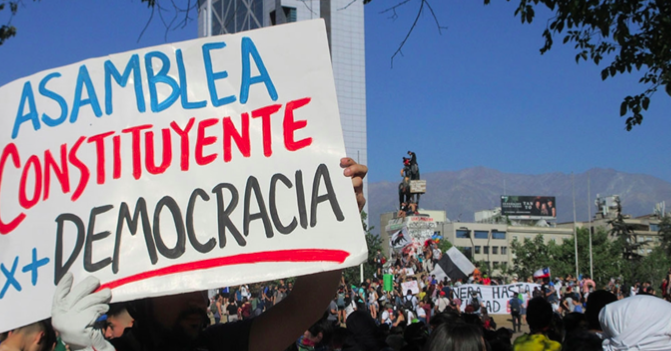
Photo courtesy of Al Jazeera
Chile, one of the world’s largest suppliers of natural resources, has been faced with public opposition due to its contribution to pollution and climate change. In response, the nation has appointed 155 Chileans to rewrite its Constitution to address the “climate and ecological emergency” caused by the abrupt growth of the lithium mining industry. By doing so, Chile has set a precedent of altering national policy in response to a crisis that endangers the well-being of its people. One hopes that this action will motivate U.S. lawmakers to modernize the American Constitution.
Thanks to its abundant supply of natural resources, Chile was able to establish itself as one of the most prosperous nations in South America. To maximize its margin of profit, Chile focuses on the resources with the highest demand and produces them efficiently. Lithium, a component of batteries, has recently received a surge of interest as the world continues to find eco-friendly alternatives to fossil fuels. In response, the Chilean mining industry has significantly bolstered its production of lithium. While lithium has helped Chile maintain its opulence and expedite the process of developing green technology, the mining industry has severe environmental and ecological impacts. Companies must extract great amounts of underground saltwater to excavate enough lithium, a process that has been traced to hotter temperatures, harsher storms, and dryer soil. In addition, lithium mines have disregarded the wellbeing of the Indigenous communities of Chile.
Following the public outrage over the mining industry’s toll on the environment and well-being of citizens, newly-elected president Gabriel Boric promises for drastic, progressive changes. Boric aims to unravel the extreme economic model Chile created during its dictatorship through decentralization: the implementation of a welfare state, the expansion of the social safety net, the increase of royalties related to the mining industry, and the revision of the Chilean Constitution.
Chile’s response to environmental concerns demonstrates that other nations must update their laws to combat modern problems. In the United States, it has become increasingly difficult to address the current environmental crisis.
Despite creating a multitude of policies to ensure the maintenance of a clean, safe environment, the United States has shown that it is unable to uphold these policies without the assistance of a constitutional amendment. The lack of amendments that address the ecological effects of the rapidly advancing manufacturing industry will only exacerbate the climate crisis. To make matters worse, the Trump Administration orchestrated more than a hundred rollbacks of environmental policies, including withdrawing the United States from the Paris Agreement and severely weakening the restriction on greenhouse gasses.
Influenced by late-stage capitalism and political corruption, the United States has been inefficient in its methods of dealing with the intense damage done to the environment. To effectively combat the deterioration of the environment, it is essential for the United States to pass more amendments, in turn securing environmental prosperity and the health of its people. It is important for the U.S. to maintain its core ideals, but it should also follow Chile’s lead and amend its constitution to solve the concerns of the modern world.




